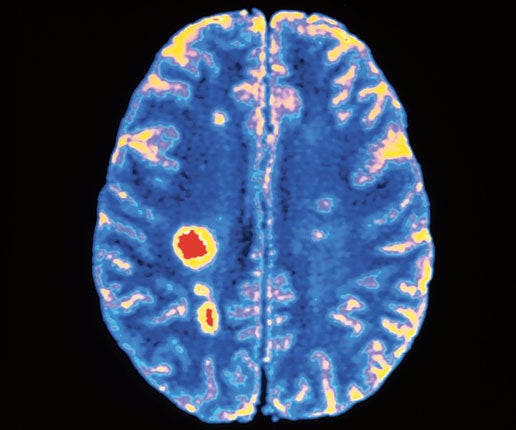
A breakthrough in stem cell research has provided a glimmer of hope for a new treatment that could halt the development of multiple sclerosis, researchers have said.
A clinical study found injecting stem cells into the brains of MS patients could potentially stop the disease advancing.
The study said the procedure was “safe, well tolerated and has a long-lasting effect that appears to protect the brain from further damage”.
MS impacts the brain and spinal cord, leading to symptoms such as vision problems, as well as issues with movement, sensation or balance. In some cases, it can lead to serious disabilities. According to the charity the MS Society, there are more than 130,000 people living with MS in the UK and each year almost 7,000 are diagnosed with the disease.
Lisa Haines, a 55-year-old with MS, told The Independent she was forced to seek stem cell treatment in Mexico after the NHS told her it would not work.
She claimed the treatment “did wonders” for her and improved her symptoms in the first five years.
“Until now, the UK has been reluctant to adopt stem cell treatment for MS – this research is a step in the right direction. Any improvements in stem cell research can only be positive,” she said.

Multiple sclerosis, a chronic disease, may take 40 years to run its course. In developing drugs to slow its progression, doctors have used brain scans to show lesions
(Science Photo Library)
The early-stage trial led by scientists at the University of Cambridge, along with teams from the University of Milan Bicocca and research hospital La Casa Sollievo della Sofferenza in Italy, injected stem cells into the brains of 15 patients with secondary MS.
The stem cells were collected from the brain tissue of a miscarried foetal donor.
Following the treatment, researchers followed the patients over 12 months, observing no treatment-related deaths or serious adverse effects.
Some side effects were observed, researchers said, however, they were deemed “either temporary or reversible”. These included minor infections and tremors.
One patient suffered a steroid-induced psychosis a month after having the treatment but went on to make a full recovery.
At the start of the trial, most of the patients required wheelchairs and showed high levels of disability, but this did not worsen in the year after the treatment.
Caitlin Astbury, research communications manager at the MS Society, said the study was “exciting” although she added further clinical trials would be needed. “But this is an encouraging step towards a new way of treating some people with MS,” she added.
Dr Aravinthan Varatharaj, clinical lecturer in neurology, University of Southampton, said researchers hoped the technique could be used to repair or regrow nerve cells in the brain but that there is not yet evidence this is possible.
He added there could be other reasons why patients did not experience a significant progression in their disease as the study was not a controlled trial.
Researchers said the findings, published in the journal Cell Stem Cell, point to a “substantial stability of the disease, without signs of progression, though the high levels of disability at the start of the trial make this difficult to confirm”.
Professor Stefano Pluchino from the University of Cambridge, who co-led the study, added: “We desperately need to develop new treatments for secondary progressive MS, and I am cautiously very excited about our findings, which are a step towards developing a cell therapy for treating MS.
“We recognise that our study has limitations – it was only a small study and there may have been confounding effects from the immunosuppressant drugs, for example – but the fact that our treatment was safe and that its effects lasted over the 12 months of the trial means that we can proceed to the next stage of clinical trials.”
‘Unbearable symptoms’
Ms Haines, who lives in Cardiff with her son, was diagnosed with primary progressive MS in 2006. She had to retire from work due to her MS symptoms, which made working “unbearable”.
She received hematopoietic stem cell transplantation (HSCT) – a similar procedure to the one in the study – in Mexico in 2017, more than 10 years after she was first diagnosed.

Lisa, 55, went to Mexico for stem cell treatment after NHS doctors said it wouldn’t work
(Lisa Haines)
“NHS doctors told me stem cell treatment wouldn’t work, but doctors in Mexico gave me hope.”
Mrs Haines said she believes the treatment stopped the advancement of her disabilities after her symptoms “vanished straight away”.
“I was less fatigued, which was the biggest improvement. Before the HSCT treatment, my hands and arms were always shaky. I couldn’t write or draw, but now I can.
“I was walking better, and I had less problems with my bladder,” she said.
Mrs Haines said her scans have been clear ever since, with no further inflammation, damage or lesions.
However, six years on from her treatment Ms Haines says her mobility has deteriorated. She believes this is because it took too long after her diagnosis to receive stem cell treatment.
“There must be action as soon as possible after a diagnosis or it won’t be as effective.
“Stem cell treatment is amazing, and it did wonders for me. Until now, the UK has been reluctant to adopt stem cell treatment for MS – this research is a step in the right direction. Any improvements in stem cell research can only be positive.”
News Related-
Using sites like LinkedIn can trigger imposter syndrome, study suggests
-
Why Gen Z fear they will raise a generation of ‘terribly behaved’ iPad kids, stoking TikTok debate about screen time
-
West Africa responds to huge diphtheria outbreaks
-
Study reveals which people are most likely to die from sepsis
-
How to stay safe over Thanksgiving as respiratory virus activity ticks up in parts of the US
-
Several more children sickened by fruit pouches tainted with lead, FDA says
-
Nevada judge rejects attempt to get abortion protections on 2024 ballot
-
What causes skin to itch? New research pinpoints a previously unknown factor
-
Traditional media more trustworthy for science news, poll suggests
-
Long-term use of ADHD drugs could bring higher risk of heart diseases – study
-
Nutrient found in beef and dairy products found to help fight cancer
-
Horror as fly found inside Missouri man’s intestines
-
‘Utterly unacceptable’ Lucy Letby was able to kill children like nurse Beverley Allitt, says inquiry chair
-
Abortion rates in US increased by 5% in 2021, the final year it remained a constitutional right under Roe: CDC
